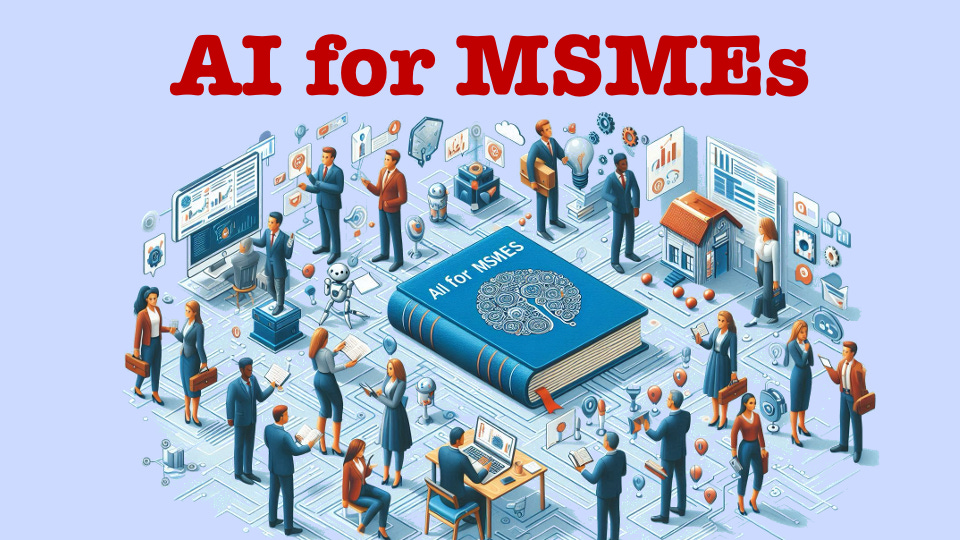Having been a productivity development consultant in my early days, I am amazed by the dizzying AI tools on offer today. It seems to increase by ten folds every day. I have not seen such a frenetic speed since the pre-internet days. Off course some may be hypes, but a few may just be the gems within the pricing range of many MSMEs.
AI is a transformative force for MSMEs throughout the world, specially in the ASEAN region. Governments are actively playing a pivotal role in promoting AI to enhance productivity, drive economic growth, and enhance the competitiveness of these businesses. This article explores the applications of AI among MSMEs, highlighting successful examples, and suggests ways for OD practittioners to promote AI education and awareness.
Applications of AI in MSMEs
AI offers numerous applications that can significantly boost productivity and operational efficiency for MSMEs. Here are some key areas where the payoff is particularly high:
1. Customer Engagement: AI-powered chatbots and virtual assistants can provide 24/7 support, enhancing customer satisfaction. For example, a furniture manufacturing MSME can use chatbots to assist customers in product selection and order placement, leading to improved customer relationships and sales.
2. Personalized Marketing: AI can analyze customer data to create targeted marketing campaigns. An apparel retailer might use AI to analyze purchasing behavior, enabling them to send personalized promotions that increase conversion rates.
3. Supply Chain Optimization: AI tools can streamline inventory management and logistics. A food manufacturing MSME could implement AI to predict demand and optimize production schedules, thereby reducing costs and improving efficiency.
4. Data-Driven Decision Making: AI can analyze large datasets to provide insights into market trends and customer behavior. For example, a pharmaceutical company might use AI to identify new product opportunities based on sales data and customer feedback.
5. Fraud Detection: Financial services MSMEs can utilize AI to monitor transactions for anomalies, helping to mitigate risks and protect against fraud.
6. Automation of Repetitive Tasks: AI can automate routine tasks, allowing employees to focus on strategic initiatives. For instance, logistics companies can use AI for route optimization, enhancing delivery efficiency.
7. Access to Finance: AI-driven lending platforms can assess creditworthiness, enabling MSMEs to secure funding that they might not obtain through traditional means.
AI Education and Awareness
To harness the full potential of AI, governments, educational institutions and professional organizations must promote AI literacy among MSMEs. Here are some strategies:
- Workshops and Training Programs: Governments can organize training sessions to educate MSME owners and employees on AI applications and tools. This could include hands-on workshops focusing on specific AI technologies relevant to their industries.
- Partnerships with Educational Institutions: Collaborating with universities and tech institutes can facilitate the development of tailored AI curricula that meet the needs of MSMEs.
- Online Resources and Courses: Providing access to online courses and resources can help MSME employees learn about AI at their own pace. Platforms like Coursera and edX offer courses on AI fundamentals that can be beneficial.
- Incentives for AI Adoption: Governments can offer grants or tax incentives for MSMEs that invest in AI technologies and training, encouraging them to integrate AI into their operations.
AI Applications by MSMEs in the ASEAN
Several MSMEs in the ASEAN region are actively leveraging AI to enhance their operations:
- Philippine MSMEs: A study indicates that Philippine businesses could generate an economic benefit of approximately P2.8 trillion ($50.7 billion) from AI solutions by 2030. Over 60% of Filipino workers have already begun using AI in their workplaces, showcasing the technology's growing integration across various sectors[5].
- Indonesian Startups: Companies like Halodoc and Gojek are utilizing AI for healthcare and logistics, respectively. Halodoc employs AI to streamline telemedicine services, while Gojek uses AI for optimizing ride-sharing and delivery services.
- Thai Retailers: Thai MSMEs are increasingly using AI for personalized marketing and inventory management. Retailers are employing AI to analyze customer data, enabling them to tailor promotions and manage stock levels effectively.
Conclusion
The integration of AI into MSMEs presents a significant opportunity for productivity enhancement and economic growth. By promoting AI education and providing support for technology adoption, governments can empower MSMEs to thrive in an increasingly competitive landscape. The successful examples from the ASEAN region illustrate the transformative potential of AI, making it an essential focus for policy initiatives aimed at boosting productivity and innovation.
NOTES:
Forthcoming ODPN Courses (in-person at the Meralco Power, Ortigas Avenue, Pasig City. (A) Designing Effective OD Interventions by Dr Melissa Reyes, PhD on September 12; and (B) Process Observation and Analysis by Dr Josephine Perez, PhD, RPsy on November 28.
Ed Canela’s Seminars
AI for HROD Professionals SAIDI Webinar on August 23, 24 and 26. Course will equip the participants with the right AI tools for key HROD tasks.
14th Advanced Leadership and Management (ALMa) Course for the University of Philippines Institute for Small Scale Industries (UP ISSI) in September. Will present Module 2: Decision Making and Analysis Improvement: Business Analytics on August 14.




